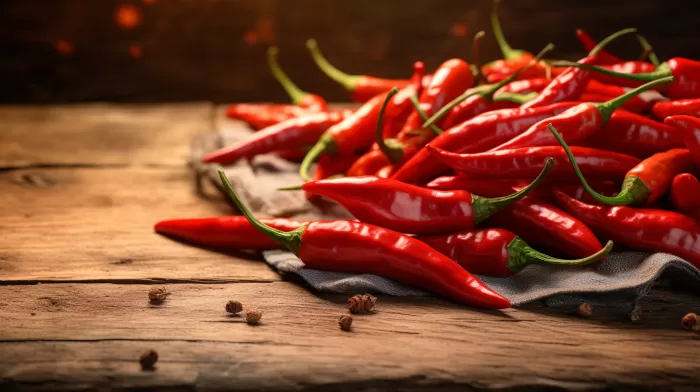Did you know that the cells lining your intestines are constantly exposed to toxins that make them more susceptible to cancer? What if there was a simple, tasty way to help boost their cancer resistance? Well, it turns out that there is, and it comes in the form of a delicious super spice that also happens to pack quite a punch!
The Power of Hot Chili Peppers
Inside hot chili peppers, there is a chemical called capsaicin. This is what causes the burning sensation in your mouth when you eat spicy foods. Researchers at the University of California, San Diego School of Medicine have discovered that capsaicin has a reaction on cell receptors found in the intestines, which reduces the risk of developing colorectal cancer.
These specialized receptors, also known as ion channels or TRPV1, were first identified in neurons that sense acidity, heat, and spicy chemicals. According to researcher Eyal Raz, M.D., these stimuli are all potentially harmful to cells, leading TRPV1 to be dubbed as a molecular ‘pain receptor.’
A Surprising Discovery
What’s truly fascinating is that the researchers found that TRPV1 is not just found in neurons, but also in the epithelial cells that line the intestinal tract. On the intestinal walls, TRPV1 is activated when it comes into contact with a substance produced by the body called epidermal growth factor receptor (EGFR). EGFR stimulates the creation of new cells on the intestinal walls, which are replaced by the body every six days or less.
As researcher Petrus de Jong, M.D., explains, “A basic level of EGFR activity is required to maintain the normal cell turnover in the gut. However, if EGFR signaling is left unrestrained, the risk of sporadic tumor development increases.”
The researchers discovered that when EGFR activates TRPV1, eventually the activity of EGFR slows down. This slowdown helps prevent the out-of-control growth of intestinal cells that can lead to cancerous tumors. In essence, TRPV1 functions as a tumor suppressor in the intestines.
Chili Peppers and Cancer Prevention
Because capsaicin interacts with TRPV1, it stimulates activity that restrains the growth of epithelial cells and ultimately fights off tumor growth. Raz suggests that individuals at high risk of developing recurrent intestinal tumors could benefit from chronic TRPV1 activation. Essentially, consuming hot peppers and other spicy foods might actually help you reduce your risk of colon cancer.
So how can you incorporate more spicy foods into your diet? Here are some suggestions:
- Spice up your meals: Feel free to experiment with adding some chili pepper flakes, hot sauce, or fresh chili peppers to your favorite dishes.
-
Enjoy a variety of cuisines: Many ethnic foods, such as Indian, Mexican, or Thai, often have a variety of spicy dishes to choose from.
-
Sip on spicy beverages: How about trying a spicy hot chocolate with a dash of chili powder? Or perhaps a refreshing watermelon jalapeno margarita?
-
Get creative with snacks: Sprinkle chili powder on popcorn or try making your own spicy kale chips.
-
Sweet and spicy desserts: Chocolate and chili peppers make an unexpectedly delicious combination, so why not try a spicy chocolate cake or some chili-infused chocolate truffles?
Remember, even though capsaicin provides potential cancer-fighting benefits, it’s crucial not to overdo it, especially if you’re sensitive to spicy foods. Start slow and work your way up, always listening to your body and its limitations.
In Conclusion
Hot chili peppers may not only be tantalizing taste buds but also providing a powerful weapon against colorectal cancer. By incorporating more spicy foods into your diet, you could be proactively fighting against tumor growth and boosting the overall health of your intestines. Just remember to approach spiciness with caution and enjoy the heat!



